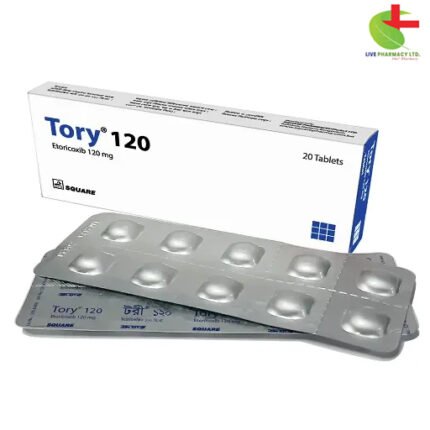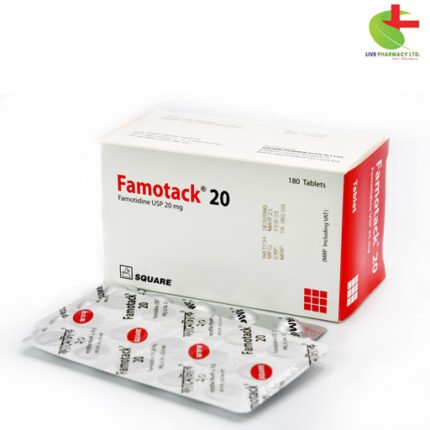Barif 40
120.30৳ Strip
- Barif tablets effectively manage chronic hyperuricemia associated with gout by inhibiting serum uric acid production through targeted xanthine oxidase inhibition.
- Tailored dosage regimen ensures personalized treatment, starting with an initial daily intake and subsequent adjustments based on individual response.
- Proactive measures are recommended for gout flare prevention, enhancing patient safety and adherence to treatment.
- Barif tablets have minimal impact on renal and hepatic function, promoting overall patient well-being.
- Contraindications are carefully considered to prioritize patient safety, ensuring optimal management of gout symptoms.
 Brand
Brand
|
Square Pharmaceuticals PLC |
|---|---|
 Generics
Generics
|
Febuxostat |
Indications
Barif tablets serve as a chronic management solution for hyperuricemia in individuals diagnosed with gout. They are specifically tailored for this purpose and are not recommended for treating asymptomatic hyperuricemia.
Pharmacology
Febuxostat, the active ingredient in Barif tablets, operates as a non-purine, selective xanthine oxidase (XO) inhibitor. By targeting xanthine oxidase, it effectively reduces serum uric acid levels, thereby curbing the production of uric acid. Febuxostat’s mechanism primarily focuses on inhibiting xanthine oxidase, without affecting other enzymes involved in purine and pyrimidine synthesis and metabolism at standard therapeutic concentrations.
Dosage & Administration
The initial recommended dosage entails a daily intake of Febuxostat 40 mg tablet. If the desired serum uric acid level (less than 6 mg per dL) isn’t achieved after two weeks, an escalation to one Febuxostat 80 mg tablet per day is suggested. Further adjustments may be warranted based on individual responses, as guided by clinical judgment.
For specific conditions like Tumor Lysis Syndrome, the prescribed dose is one Febuxostat 120 mg tablet daily, initiated two days before commencing cytotoxic therapy and maintained for at least 7 days, extendable to 9 days if deemed necessary.
Gout Flares
Initiation of Febuxostat tablets may trigger gout flares due to fluctuating serum uric acid levels. Prophylactic measures with non-steroidal anti-inflammatory drugs (NSAIDs) or colchicine are advisable upon starting treatment to mitigate potential flares. Continuation of Febuxostat tablets alongside managing gout flares is recommended, tailored to individual patient needs.
Renal and Hepatic Impairment
Febuxostat administration doesn’t necessitate dosage adjustments in patients with mild to moderate renal or hepatic impairment.
Pediatric Use
Febuxostat’s safety and efficacy haven’t been established in pediatric patients under 18 years of age.
Interaction
Several interactions with other medications are noted, including those with Mercaptopurine/Azathioprine, Rosiglitazone/CYP2C8 substrates, Naproxen, and others. These interactions should be carefully considered and managed accordingly.
Contraindications
Febuxostat is contraindicated in patients concurrently treated with azathioprine, mercaptopurine, or theophylline due to potential interactions.
Side Effects
Adverse reactions to Barif may include gout flares, liver function abnormalities, diarrhea, nausea, headache, rash, and edema. While most reactions are mild or moderate, rare serious hypersensitivity reactions have been reported.
Pregnancy & Lactation
Febuxostat falls under Pregnancy Category C. Its use during pregnancy should be weighed against potential fetal risks. Additionally, caution is advised when administering Febuxostat to nursing mothers due to uncertain excretion in human milk.
Precautions & Warnings
Barif users may experience an increase in gout flares during treatment initiation, requiring proactive management. Close monitoring for cardiovascular events and liver enzyme elevations is essential during therapy.
Overdose Effects
Studies on Febuxostat in healthy subjects showed doses up to 300 mg daily for seven days without evident dose-limiting toxicities.
Therapeutic Class
Barif belongs to the therapeutic class of drugs used in Gout treatment.
Storage Conditions
It is recommended to store Barif tablets below 30°C, away from light and moisture, and out of children’s reach.













Reviews
There are no reviews yet.